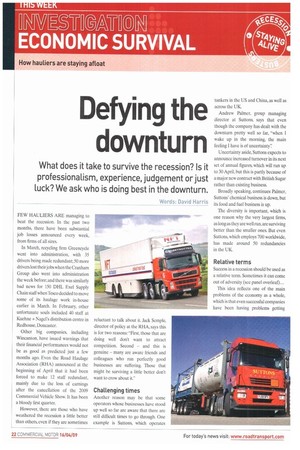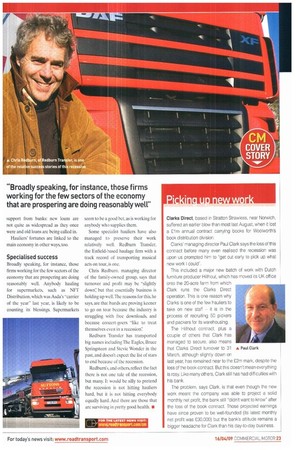Defying the downturn
Page 22

Page 23

If you've noticed an error in this article please click here to report it so we can fix it.
What does it take to survive the recession? Is it professionalism, experience, judgement or just luck? We ask who is doing best in the downturn.
Words: David Harris
FEW HAULIERS ARE managing to beat the recession. In the past two months, there have been substantial job losses announced every week, from firms of all sizes.
In March, recycling firm Greencycle went into administration, with 35 drivers being made redundant; 50 more drivers lost their jobs when the Cranham Group also went into administration the week before:and there was similarly bad news for 150 DHL Exel Supply Chain staff when Tesco decided to move some of its haulage work in-house earlier in March. In February, other unfortunate souls included 40 staff at Kuehne + Nagel's distribution centre in Redhouse. Doncaster.
Other big companies, including Wincan ton, have issued warnings that their financial performances would not be as good as predicted just a few months ago. Even the Road Haulage Association (RHA) announced at the beginning of April that it had been forced to make 12 staff redundant, mainly due to the loss of earnings after the cancellation of the 2009 Commercial Vehicle Show. It has been a bloody first quarter.
However, there are those who have weathered the recession a little better than others, even if they are sometimes reluctant to talk about it. Jack Semple, director of policy at the RHA, says this is for two reasons: "First, those that are doing well don't want to attract competition. Second — and this is genuine — many are aware friends and colleagues who run perfectly good businesses are suffering. Those that might be surviving a little better don't want to crow about it."
Challenging times
Another reason may be that some operators whose businesses have stood up well so far are aware that there are still difficult times to go through. One example is Suttons, which operates tankers in the US and China, as well as across the UK.
Andrew Palmer, group managing director at Suttons, says that even though the company has dealt with the downturn pretty well so far, "when I wake up in the morning, the main feeling I have is of uncertainty': Uncertainty aside, Suttons expects to announce increased turnover in its next set of annual figures, which will run up to 30 April, but this is partly because of a major new contract with British Sugar rather than existing business.
Broadly speaking, continues Palmer, Suttons' chemical business is down, but its food and fuel business is up.
The diversity is important. which is one reason why the very largest firms, as long as they are well run, are surviving better than the smaller ones. But even Suttons, which employs 700 worldwide, has made around 50 redundancies in the UK.
Relative terms
Success in a recession should be used as a relative term. Sometimes it can come out of adversity (see panel overleaf)...
This idea reflects one of the main problems of the economy as a whole, which is that even successful companies have been having problems getting support from banks: new loans are not quite as widespread as they once were and old loans are being called in.
Hauliers' fortunes are linked to the main economy in other ways, too.
Specialised success
Broadly speaking, for instance, those firms working for the few sectors of the economy that are prospering are doing reasonably well. Anybody hauling for supermarkets, such as NI-T Distribution, which was Asda's "carrier of the year" last year, is likely to be counting its blessings. Supermarkets seem to be a good bet, as is working for anybody who supplies them.
Some specialist hauliers have also managed to preserve their work relatively well. Redburn Transfer, the Enfield-based haulage firm with a track record of transporting musical acts on tour, is one.
Chris Redburn. managing director of the family-owned group, says that turnover and profit may be "slightly down': but that essentially business is holding up well. The reasons for this, he says, are that hands are proving keener to go on tour because the industry is struggling with free downloads, and because concert-goers "like to treat themselves even in a recession': Redburn Transfer has transported big names including The Eagles, Bruce Springsteen and Stevie Wonder in the past, and doesn't expect the list of stars to end because of the recession.
Redburn's, and others, reflect the fact there is not one tale of the recession, but many. It would be silly to pretend the recession is not hitting hauliers hard, but it is not hitting everybody equally hard. And there are those that are surviving in pretty good health. •








































































































































